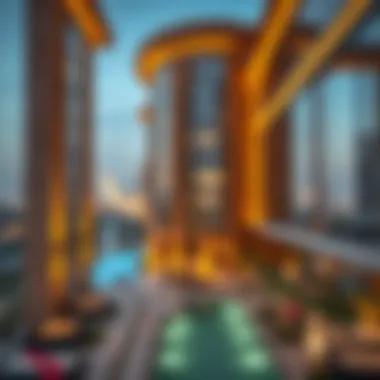In-Depth Look at Nabni Developments in Dubai Real Estate


Intro
In the dynamic landscape of Dubai's real estate market, Nabni Developments stands out as a key player driving innovation and growth. With the city's skyline constantly evolving, the company has carved its niche by focusing on modern projects that cater to the needs of a diverse demographic. This article aims to unveil a comprehensive analysis of Nabni's strategies, projects, and its overall impact on the UAE's property sector.
Understanding the nuances of such a vibrant market is essential for various stakeholders, including investors, property buyers, real estate agents, and developers. Through this exploration, the intricacies of Nabni developments will be unveiled, ensuring readers are equipped with valuable insights into the current trends and opportunities.
As we delve into the property market overview, we will touch on significant market trends and dissect key neighborhood insights. This foundational knowledge will enable readers to grasp the broader implications of Nabni’s role and learn practical guidelines for navigating the buying and selling landscape effectively.
Let’s embark on this insightful journey into Nabni Developments and uncover what the future holds for Dubai's real estate market.
Overview of Nabni Developments
Nabni Developments represents a significant component of Dubai's bustling real estate landscape. Understanding this company is not merely about recognizing its presence; it is crucial for investors, buyers, and agents navigating the intricate matrix of Dubai's property market. As a hub for luxurious living and commercial prowess, knowing how Nabni operates can illuminate opportunities that may otherwise remain obscured.
This section lays the foundation for a deeper exploration of Nabni by highlighting key insights that provide context to its prominence. Several factors underpin the importance of discussing Nabni's developments.
- Innovative Projects: Nabni is renowned for constructing cutting-edge buildings that don’t just meet contemporary standards but often exceed them. This is particularly vital in a city like Dubai, where the skyline continuously evolves.
- Market Position: Grasping Nabni's footprint in the real estate sector offers a window into market trends and potential investment returns. It reveals how the company responds to demand and adapts to economic conditions.
- Community Impact: Beyond financial metrics, Nabni's contributions to community development enhance the social fabric of Dubai. This holistic approach fosters trust and attracts diverse buyers.
All these elements weave together to present a clear picture of not just Nabni as a brand but as a pivotal player shaping the city’s future.
History and Foundational Principles
The origins of Nabni are steeped in the rich history of Dubai's rapid expansion. Founded during a time when the skyline was undergoing transformative changes, Nabni began with a clear ambition: to create enduring, high-quality spaces for living and working. Their fundamental principles, derived from a necessity to match Dubai’s dynamic growth, intertwine modernity with tradition. This connection between the past and present informs their architectural philosophy, ensuring that projects are not merely functional but also culturally resonant.
Moreover, Nabni did not enter the market blindly. Their approach involves meticulous research and community engagement, ensuring that developments mirror the aspirations of the residents they serve. It's this blend of vision and pragmatism that has laid the groundwork for their present and future endeavors.
Core Values and Mission
At the heart of Nabni's operations lies a dedication to integrity, innovation, and excellence. These core values are not just slogans but are actively practiced in every phase of project development.
- Integrity: This is about fostering transparent engagements with clients and investors alike, reassuring them that their investments fall into capable hands. Nabni believes in maintaining strong ethical standards throughout their operations.
- Innovation: With rapid technological advancements, Nabni embraces innovative building techniques and sustainable practices. Such initiatives not only adhere to global standards but allow the company to lead rather than follow in the competitive real estate space.
- Excellence: The relentless pursuit of quality manifests itself in every brick laid and every square foot designed. Each project aims to create enduring value for their clients.
Nabni’s mission encapsulates these values: to transform living and working spaces into inspiring environments that enhance the quality of life. For real estate investors and buyers, this mission translates into a brand synonymous with reliability and aspirational living, making Nabni a cornerstone of Dubai’s ongoing narrative in real estate.
Significant Projects by Nabni
Understanding the significant projects undertaken by Nabni is essential for grasping its role in shaping Dubai's dynamic real estate market. These projects reflect the company’s commitment to innovation, sustainability, and the enhancement of urban living. By diving into the specifics of Nabni's work, stakeholders including investors, property buyers, and real estate agents can gather insights into market trends and the future direction of developments in Dubai.
Residential Developments
Project Features and Designs
The residential projects developed by Nabni showcase distinctive architectural elements that add value to the urban landscape. Sustainably designed homes with energy-efficient systems not only reduce environmental impact but also appeal to modern buyers’ preferences for eco-friendly living. A notable characteristic of these developments is the integration of open spaces and community areas, which encourage social interaction among residents. This design choice is strategic, as it creates a sense of belonging and community, often enhancing the appeal of living in such complexes.
One particular project, the Green Oasis Residences, emphasizes natural light and ventilation, leading to reduced energy consumption. However, the initial higher construction costs associated with such innovative features can be a point of contention for budget-conscious buyers.
Market Reception
Nabni's residential developments have generally received positive reception from both the market and existing residents. The quality of construction and thoughtful design have earned accolades, pushing demand higher than anticipated. Buyers value the balance between modern amenities and traditional aesthetics, which resonates well in the multicultural environment of Dubai.
Nevertheless, even with high demand, there can be occasional criticism regarding pricing strategies. Some residential units, especially in sought-after areas, may be viewed as being priced towards the higher end, potentially excluding a broader market segment.
Investment Potential
Investing in Nabni's residential properties presents considerable upside owing to their location in rapidly developing neighborhoods. Many projects are situated near key infrastructural developments, such as the metro lines and business hubs, ensuring that property values are poised for growth.
One distinguishing factor of these investments is the potential for rental yields, which tend to be robust in Dubai’s competitive market. Investing in units like those in the Desert Gardens project shows promise, yet prospective buyers must consider market fluctuations and demand cycles, which can sway rental income predictability.


Commercial Developments
Key Locations
Nabni’s commercial ventures are strategically placed in areas that are already thriving or are on the verge of emerging as business hotspots. Locations like Dubai Silicon Oasis and Dubai Marina offer not just high visibility but also accessibility to transport and amenities, making them prime choices for businesses looking to establish a presence.
This geographical advantage aids in attracting quality tenants and clients, as businesses benefit from foot traffic and nearby facilities. In some instances, however, the location choices depend heavily on regional developments and legislative changes that can affect business viability in the future.
Business Impact
The impact that Nabni's commercial developments have on local economies cannot be understated. By introducing modern office spaces and retail experiences, these projects facilitate job creation and economic diversification. For instance, developments in Business Bay have led to a noticeable uptick in small businesses setting up shop, benefiting from the cluster effect.
However, challenges persist, particularly with market saturation, as competition intensifies in some areas, necessitating continued innovation in offerings to remain attractive to businesses.
Future Construction Plans
Nabni has ambitious plans that include several upcoming commercial projects aimed at expanding their footprint in the market further. With an eye on incorporating smart technologies and sustainable practices, their future plans signal a shift towards adapting to the evolving needs of both businesses and consumers in a post-pandemic world.
These developments offer a unique opportunity for both investors and potential tenants, sparking interest in co-working spaces and tech hubs that align with modern working styles. However, the viability of these projects will depend largely on prevailing economic conditions and government policies concerning business in Dubai.
Mixed-Use Complexes
Design Integration
Nabni's mixed-use complexes showcase a masterful blend of residential, commercial, and recreational spaces. The design integration allows for seamless transitions between different areas, esthetically enhancing the urban fabric and offering residents convenience at their doorstep. Such developments promote a lifestyle where living, working, and leisure can coexist effectively.
A unique feature of these complex designs is the emphasis on green spaces and pedestrian accessibility, catering to the growing demand for sustainable living solutions. However, maintaining balance in zoning regulations and managing communal spaces can be challenging but essential for their success.
Community Benefits
The community-focused design of Nabni's mixed-use complexes fosters inclusivity, offering various amenities such as parks, cafes, and educational institutions within arm's reach. This approach not only enhances the quality of life for residents but encourages a robust community spirit.
The integration of such amenities typically appeals to families looking for vibrant neighborhoods, though it can also lead to challenges in managing community dynamics, especially in larger complexes.
Market Performance
The mixed-use market under Nabni has demonstrated resilient performance, showcasing an upward trajectory even amid economic fluctuations. Demand for these properties remains strong due to their holistic approach to urban living.
However, the performance of these complexes can vary based on location and economic conditions, ensuring that thorough market analysis is vital for stakeholders considering investment in this segment.
Innovations in Construction and Design
Innovations in construction and design play a crucial role in enhancing the efficiency, sustainability, and aesthetic appeal of real estate projects. As competition heats up in Dubai's property market, developers like Nabni are pushing boundaries to redefine architectural norms while prioritizing environmental considerations and modern technologies. The goal is not just about erecting buildings but about creating livable, functional spaces that cater to a diverse population. In this section, we will explore two significant areas of innovation that are shaping Nabni's developments.
Sustainable Building Practices
Sustainable building practices have become the backbone of modern construction, harmonizing technological advancements with eco-friendly approaches. Nabni's commitment to sustainability is evident in all stages of their projects, from conceptual design to completion. They incorporate materials that are responsibly sourced, minimizing the environmental impact while ensuring durability.
One standout feature of their developments is the use of energy-efficient systems, such as solar panels and high-performance insulation. These not only reduce energy consumption but also lower utility costs for residents and businesses alike. Furthermore, strict adherence to local regulations and continuous investment in green technologies reflect Nabni's dedication to sustainability.
Some key aspects of Nabni's sustainable building strategies include:
- Water conservation techniques, like rainwater harvesting systems that reduce strain on municipal resources.
- Smart building technologies that monitor and optimize energy usage in real-time, helping to cut down waste.
- Landscaping with native plants, which requires less water and maintenance, blending buildings seamlessly into the local environment.
Adopting these practices shows that Nabni not only cares about today but is also thinking ahead, creating spaces that cater to future generations.
Technological Advancements in Real Estate
Technology is transforming how real estate is conceived, developed, and managed. Nabni uses various advanced technologies to streamline construction processes and improve design functionalities. The integration of Building Information Modeling (BIM) allows for precise planning and visualization; this helps avoid costly delays and miscalculations during the build.


Moreover, innovations like 3D printing in construction are being explored, offering rapid prototyping for design elements and even complete structures. This technique can drastically reduce both time and material costs. Alongside this, virtual reality (VR) is increasingly utilized for client presentations, helping investors and buyers visualize the end product before construction even begins.
These technological trends highlight the need for enhanced communication between stakeholders, fostering a collaborative environment. Here are some notable technological advancements being embraced:
- Artificial Intelligence (AI) algorithms that analyze market data, predicting trends that can influence design and investment decisions.
- Drone technology for site inspections allowing quicker assessments of project progress and identifying any issues before they escalate.
- Automated building management systems that ensure optimal functionality and comfort for occupants once projects are completed.
In summary, through innovations in both sustainable practices and technology, Nabni not only positions itself as a leader in Dubai’s competitive real estate market but also ensures that their developments meet the needs of a rapidly evolving society.
"Innovation is the ability to see change as an opportunity, not a threat."
This pivotal mindset encourages Nabni to continually push for advancements that lead to a brighter, greener future.
Market Position and Competitive Analysis
In the rapidly evolving landscape of Dubai's real estate market, understanding the market position and conducting a competitive analysis is paramount for stakeholders. This segment not only pinpoints Nabni's current standing but also sheds light on its strategic initiatives tailored to mitigate risks and harness opportunities. For investors, buyers, and real estate professionals, this knowledge serves as a roadmap to navigate the complexities of the market.
Current Market Trends
The real estate market in Dubai is characterized by several evolving trends that shape both investor behavior and consumer expectations. These trends are influenced by a variety of factors including economic conditions, technology, and shifting demographics.
- Demand for Sustainability: There's a heightened interest in eco-friendly and sustainable living spaces, influencing how developers approach project designs. Nabni has taken note of this and often integrates green practices in their developments, appealing to environmentally-conscious buyers.
- Rise of Smart Homes: The advent of smart technology has revolutionized the housing market. Buyers increasingly look for properties equipped with the latest smart home features. Nabni’s inclination to adopt such technologies positions it favorably among tech-savvy clients.
- Shift Toward Affordable Housing: As the demographic landscape shifts with more young professionals settling in Dubai, there's a growing demand for affordable housing options. Nabni is attuned to this need, investing in projects designed to accommodate diverse income levels while maintaining quality.
"The ability to adapt to market trends is what separates the wheat from the chaff in the competitive real estate sector."
These trends motivate Nabni's strategic decisions and marketing approaches, illustrating their proactive nature in a competitive environment.
Comparative Analysis with Competitors
When juxtaposing Nabni with its key competitors, several critical insights emerge that illustrate its unique offering and market strategies:
- Market Share: Nabni holds a significant share of the market, primarily within residential and mixed-use developments. This is coupled with a brand reputation that emphasizes innovation and quality.
- Design Philosophy: Unlike some competitors who prioritize rapid development cycles, Nabni is known for its thoughtful design process. Their emphasis on aesthetics and functionality creates a distinctive edge, ensuring that each project aligns with modern lifestyles.
- Customer-Oriented Approach: Many firms in the market may concentrate on acquisition rather than client retention. In contrast, Nabni focuses on fostering long-term relationships with clients through robust post-sale services and regular engagement.
- Integration of Technology: While some competitors lag in adopting new technologies, Nabni's early integration into smart solutions gives them a competitive edge, appealing particularly to the millennial and Gen Z demographics.
This not only enhances the value proposition for buyers but also positions the company as an industry leader, fostering confidence among investors.
Considering these factors, it's evident that Nabni Developments distinguishes itself in the highly competitive Dubai real estate market by aligning closely with market trends and engaging strategically with its consumer base.
Impact of Economic Factors on Nabni Developments
Understanding the economic factors that influence Nabni Developments is crucial for grasping its significance in the bustling Dubai real estate market. This exploration sheds light on how these elements dictate the direction and success of the company’s initiatives. The interplay of economic health, government policies, and global investment flows not only affects Nabni’s project viability but also outlines broader trends for potential investors and stakeholders.
Regulatory Environment
The regulatory environment in Dubai plays a pivotal role in defining the framework within which Nabni operates. Local laws and guidelines influence everything from project approvals to construction practices. For instance, the enforcement of strict building codes and environmental regulations can significantly affect timelines and costs. Nabni must stay compliant with laws like the Dubai Land Department regulations and the Real Estate Regulatory Agency’s (RERA) mandates.
Additionally, ongoing rezoning efforts in certain areas may provide Nabni with fresh opportunities for development in previously underutilized land. Adapting to these regulatory shifts ensures that Nabni remains competitive while aligning with the emirate's vision for sustainable urban development.
Moreover, the government’s emphasis on foreign investment has led to favorable tax policies and ownership incentives which bolster Nabni’s capacity to attract overseas buyers. An agile response to regulatory changes often translates to a significant advantage in the competitive landscape.
Foreign Investment Trends
Foreign investment trends are the lifeblood of Dubai’s real estate market and have a direct impact on Nabni’s projects. The influx of international investors not only adds liquidity to the market but often shapes the types of developments that gain traction. Nabni has been particularly astute in identifying and leveraging these trends.
- Recent Data and Statistics:
- Market Sentiment:
- Nabni's Position:
- According to reports, foreign investments in Dubai’s real estate have increased by over 30% since the implementation of the Golden Visa program.
- Nationalities from India, the UK, and China currently dominate the buying landscape, driving demand for projects that cater to luxury living and high-end amenities.
- The perception of Dubai as a safe haven for investment continues to bloom, bolstered by a stable economy and strategic location. Investors are drawn to not just the lifestyle but the promise of substantial returns on investments, with properties in high-demand areas often seeing value appreciation over time.


- With Nabni’s ventures often aligned with international trends—such as eco-friendly developments or projects incorporating smart home technology—the company has positioned itself effectively to capitalize on the influx of foreign capital.
Identifying shifts in foreign investment dynamics allows Nabni to refine its development strategies and address the needs of a diverse clientele. This ongoing adaptation is vital for sustaining growth amidst a rapidly evolving market landscape.
"The nature of real estate is such that the economic climate can lead to roller coaster rides; aware players like Nabni can stabilize their path."
In summary, economic factors, particularly those pertaining to regulatory frameworks and foreign investment trends, are central to Nabni's current and future standing in Dubai’s real estate market. Investors and stakeholders alike must recognize these elements’ profound influence on project outcomes and overall market health.
Customer Experience and Relations
Customer experience has taken on new heights in today’s competitive market, especially in a vibrant place like Dubai. The realm of real estate operates within interactions that often define the relationship between developers and clients. For Nabni Developments, prioritizing customer experience is not merely a box to check; it’s the core of their business strategy. This approach holds significant implications for client retention, satisfaction, and ultimately, the overall success of Nabni’s projects.
Client Engagement Strategies
Creating a sturdy connection with clients is essential for establishing trust. Nabni Developments employs various strategies to engage its clients effectively. These strategies often blend traditional outreach with modern techniques. Here are a few notable methods:
- Personalized Communication: Individual interactions matter. Nabni tailors communication according to client preferences and histories, ensuring a more appealing approach. This helps in making clients feel valued.
- Interactive Platforms: They provide user-friendly platforms where clients can explore properties, view updates, and pose queries directly. By leveraging technology, Nabni makes the search for homes more accessible.
- Regular Updates and Newsletters: Informing clients about new projects and market trends keeps them in the loop and strengthens their connection to the brand. This proactive communication approach significantly boosts customer loyalty.
In essence, by implementing diverse engagement strategies, Nabni enhances not just client interactions but also builds a stronger community driven by shared interests and trust.
Feedback and Improvement Mechanisms
Acting on feedback is a vital part of any customer-centered approach. Nabni Developments recognizes that understanding client thoughts helps in refining their offerings. Here are the feedback mechanisms they actively incorporate:
- Surveys and Focus Groups: Gathering insights through structured surveys allows Nabni to comprehend client satisfaction levels. Focus groups delve deeper, capturing qualitative data that surveys may miss.
- Online Reviews and Social Media Listening: Keeping tabs on what clients say across online platforms helps Nabni identify trends or issues, transforming feedback into actionable insights.
- Response Teams: Dedicated teams work on addressing concerns or suggestions promptly. The aim is not just to respond; it's about demonstrating to customers that their opinions truly count and influence decision-making.
"Listening to clients can reveal hidden gems that push a company’s innovation while reshaping its trajectory within the market."
The commitment to feedback and the resultant iterative process are what set Nabni apart. Every recommendation or critique is seen as a stepping stone towards delivering a more refined experience.
Future Directions for Nabni Developments
The landscape of Dubai's real estate industry is constantly changing, and Nabni Developments is at the forefront of this evolution. Understanding the future direction of the company is crucial for investors, buyers, agents, and developers. A well-articulated roadmap not only informs stakeholders about where Nabni is headed but also highlights potential opportunities and risks involved. As Dubai further establishes itself as a global hub for business and tourism, the nuances of Nabni’s future endeavors provide insights into market trends and investment viability.
Projected Growth Areas
Nabni Developments has strategically identified several projected growth areas that align with Dubai's overarching ambitions. Some key points of focus include:
- Sustainable Communities: There is an increasing market demand for eco-friendly living spaces, prompting Nabni to spearhead projects that integrate sustainable practices. This trend not only attracts environmentally conscious buyers but also aligns with governmental policies that advocate for sustainability in construction.
- Mixed-Use Developments: These projects combine residential, commercial, and recreational spaces into cohesive units. Nabni has recognized the potential in this area, particularly in emerging neighborhoods within Dubai that are undergoing extensive infrastructure upgrades. These mixed-use complexes benefit residents by providing accessibility to amenities, thereby enhancing community living.
- Affordable Housing Initiatives: The rising cost of living in Dubai necessitates a balanced approach to housing. Nabni is devising strategies to cater to this demographic by developing affordable housing which can include smaller units with modern amenities. This step not only meets the needs of first-time buyers but also ensures a steady flow of potential tenants for investors.
- Revitalization of Older Districts: Nabni is looking into revitalizing older areas that may no longer reflect modern living standards. By injecting energy into these districts with thoughtful renovations and modern designs, there's potential for a resurgence in interest and property values, creating investment opportunities for developers.
"A comprehensive understanding of the projected growth areas allows stakeholders to align their strategies with Nabni Developments' vision, ensuring a collaborative approach in navigating Dubai's dynamic real estate market."
Long-Term Vision and Goals
Nabni’s long-term vision transcends mere profit margins; they aspire to be a catalyst in shaping Dubai's urban identity. Their goals include:
- Innovation in Design and Construction: Nabni aims to incorporate cutting-edge technology in their construction processes and architectural designs. This pursuit of innovation ensures that their projects not only meet current market demands but also set trends within the industry.
- Community Engagement: Beyond constructing properties, Nabni envisions a role in fostering vibrant communities. They are focusing on enhancing public spaces and amenities, thus elevating the overall quality of urban life in the areas where they develop.
- Strategic Partnerships: Building alliances with local and international stakeholders is a priority for Nabni. These partnerships can facilitate shared resources and insights, enhancing project outcomes while also fostering a collaborative synergy.
- Emphasis on Customer Relations: A cornerstone of Nabni's long-term goals is maintaining superior customer relations. By harnessing feedback mechanisms, they aim to continuously refine their projects, ultimately tailoring their offerings to meet the evolving needs of buyers.
Closure
The conclusion serves as a vital element in this article as it synthesizes the various insights gleaned from examining Nabni Developments. Essentially, it wraps up complex information and presents it succinctly for the reader’s benefit. In the fast-paced environment of Dubai’s real estate market, investors and stakeholders seek clarity on how developments like Nabni are shaping trends, regulations, and future prospects. The conclusion does just that by reinforcing the critical takeaways from earlier sections.
Summary of Insights
To distil the key findings:
- Nabni’s Commitment to Innovation: The company’s integration of sustainable building practices and technological advancements highlights its forward-thinking approach. This orientation towards eco-friendly designs appeals to modern consumers who prioritize sustainability.
- Strong Market Positioning: Through strategic project development and a keen understanding of market dynamics, Nabni has carved out a significant niche. Its ability to balance luxury with usability makes its projects attractive not only to investors but also to buyers looking for high-quality living or working spaces.
- Economic Adaptability: The thorough analysis of economic factors shows Nabni's agility in navigating the complex regulatory landscape of Dubai. This adaptability affords investors a sense of security, knowing that their investments can withstand shifts in the market.
Final Thoughts on the Future of Nabni Developments
Looking ahead, the future for Nabni appears promising. With continued emphasis on community-oriented designs and innovative technologies, the company is well-postured to adapt to the evolving demands of the market. Potential areas for growth include:
- Expansion into Sustainable Living: As the global market increasingly prioritizes sustainability, Nabni could lead the way in eco-conscious real estate development. This aligns with not just consumer preferences but also broader governmental initiatives towards greener cities.
- Increased Foreign Investment: Future foreign investment trends indicate a burgeoning interest in Dubai’s property market. Nabni could leverage this to expand its portfolio and undertake more ambitious projects.
- Technological Integration: Embracing smart living solutions within their projects could enhance the appeal of Nabni’s offerings. As technology evolves, there may be opportunities to integrate advanced features that improve both livability and investment value.
In sum, this conclusion encapsulates valuable insights into Nabni Developments that can guide investors, buyers, and real estate professionals alike. The analysis firmly positions Nabni as a significant player within the Dubai property landscape, backed by strong market fundamentals and innovative strategies.











